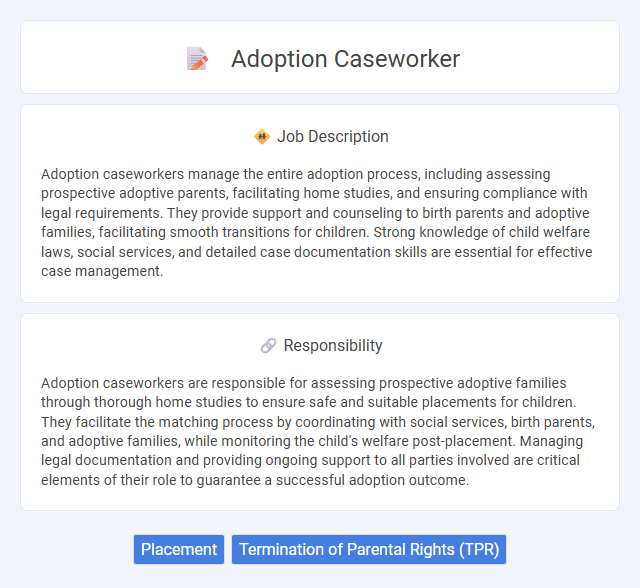
Adoption caseworkers manage the entire adoption process, including assessing prospective adoptive parents, facilitating home studies, and ensuring compliance with legal requirements. They provide support and counseling to birth parents and adoptive families, facilitating smooth transitions for children. Strong knowledge of child welfare laws, social services, and detailed case documentation skills are essential for effective case management.
People with strong empathy, excellent communication skills, and the ability to handle stressful situations will likely be suitable for an adoption caseworker job. Those who can maintain emotional resilience and demonstrate cultural sensitivity might have a higher probability of succeeding in this role. Individuals struggling with managing emotional stress or lacking interpersonal skills may find it challenging to fulfill the job's demands effectively.
Qualification
Adoption caseworkers typically require a bachelor's degree in social work, psychology, or a related field, with many positions preferring a master's degree in social work (MSW) or counseling. Professional licensure or certification, such as Licensed Clinical Social Worker (LCSW), enhances prospects and credibility when managing sensitive family dynamics and legal processes. Experience in child welfare, family services, or case management is critical, along with strong communication skills and knowledge of adoption laws and foster care regulations.
Responsibility
Adoption caseworkers are responsible for assessing prospective adoptive families through thorough home studies to ensure safe and suitable placements for children. They facilitate the matching process by coordinating with social services, birth parents, and adoptive families, while monitoring the child's welfare post-placement. Managing legal documentation and providing ongoing support to all parties involved are critical elements of their role to guarantee a successful adoption outcome.
Benefit
Adoption caseworkers likely provide critical support to families by managing the complex legal and emotional processes involved in adoption, which may increase the chances of successful placements and positive outcomes for children. Their expertise probably ensures adherence to regulations and promotes the child's well-being throughout the transition. This role tends to benefit communities by fostering safe, stable family environments and offering essential guidance to birth and adoptive parents.
Challenge
Adoption caseworkers likely face challenges related to managing complex family dynamics and ensuring the well-being of children throughout the adoption process. They may encounter emotional stress when balancing the needs and rights of birth parents, adoptive families, and children. Navigating legal requirements and coordinating with multiple agencies could also present ongoing difficulties in this role.
Career Advancement
Adoption caseworkers often advance by gaining specialized certifications in social work or family services, enhancing their expertise in child welfare and legal processes. Career progression typically leads to supervisory roles or positions in program management within governmental or nonprofit agencies. Developing skills in counseling, investigation, and cross-agency coordination significantly increases opportunities for leadership and higher salary brackets in child advocacy.
Key Terms
Placement
Placement coordination is a critical responsibility for adoption caseworkers, involving the thorough assessment of prospective adoptive families to ensure child safety and well-being. They facilitate matching children with suitable families based on psychological, social, and legal criteria, aiming to create stable, nurturing environments. Effective placement management requires collaboration with legal professionals, social services, and foster care systems to expedite permanent home placement.
Termination of Parental Rights (TPR)
Adoption caseworkers play a critical role in managing Termination of Parental Rights (TPR) processes, ensuring legal grounds are meticulously documented to protect child welfare. They coordinate with legal authorities, social workers, and families to expedite TPR petitions, facilitating permanent placements for children in foster care or adoption. Expertise in child protection law and strong case management skills are essential to navigate complex family dynamics and uphold children's best interests during TPR proceedings.
 kuljobs.com
kuljobs.com